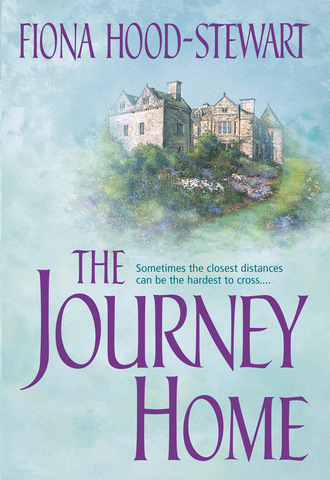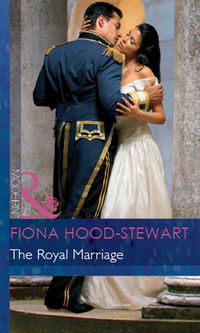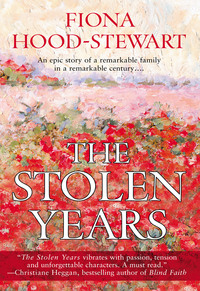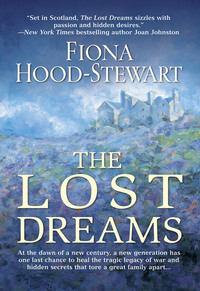
Полная версия
The Journey Home
“Do you think you can walk?” he asked doubtfully.
“Of course I can,” she lied, attempting to rise. “I’ll be perfectly all right. You can go now.”
“I won’t leave you here.”
“Oh, please just go. You’ve caused enough trouble already. I’ll be fine.” But he stood his ground, looming over her, tall, dark and scowling, as confident as though he owned the place.
“All you’ve done from the moment I’ve met you is complain,” he exclaimed, his mouth breaking into a smile that lit up his handsome face. “Now please. Stop arguing and be reasonable. If we don’t get moving we’ll be stuck out here in the dark, and I don’t have a flashlight.”
India eyed him with suspicion. “Who are you anyway?” she asked.
“My name’s Buchanan. Jack Buchanan. Like I told you, I’m staying at Dalkirk with the Kinnairds. Are you their neighbor?”
“I suppose so.”
“What’s does that mean?” he asked, puzzled. “Either you are or you aren’t.”
“Yes, I am the neighbor—in a way. Though I fail to see what that has to do with you,” she added, noticing the shadows flitting eerily to and fro in the failing afternoon light. She found the idea of being stuck by herself, with no light and little notion of how to get back to the house, rather daunting. She reluctantly swallowed her pride and rose.
“Since you’re determined to come along, we’d better go, though I’m sure I could manage. Thank you all the same,” she added as a grudging afterthought.
“Okay. Let’s get moving. By the way, what’s your name?”
“India Moncrieff,” she replied, cross that she couldn’t just walk off and dump him.
“Nice to meet you, too,” he replied, making no effort to conceal the cynical glint in his eyes.
India straightened her jacket. If he was a friend of Peter and Diana’s, there couldn’t be much harm in letting him take her back to the house. Except for the damage it was doing to her pride, she realized ruefully, watching him pick up his shotgun and whistle to the dogs, his dark hair tousled by the wind.
They emerged from the glen and headed toward the burn. At the first blast of biting wind whipping her face, India’s mood changed, as suddenly, all her reasons for being here today came to mind. She trudged on, thinking bleakly of what awaited her back at the house. She’d gone to the glen to flee reality, to try to find some peace, if only for a little while. But it had been a short-lived reprieve.
They crossed the rickety wooden bridge, the dogs splashing through the ice-cold water of the shallow burn, then shaking themselves vigorously on the other side.
As they began the short trek up the steep hill that led to the gardens and the lawn, India thought of the future, and what it would hold for her now that she was alone. Serena, her half sister, was her only close family now; she barely knew her cousins. A stab of loneliness made her catch her breath, but she pushed the thought aside, and directed her focus to the man beside her. His presence was rather forbidding, despite his rakish American good looks and determination to escort her home.
She quickened her pace and reached the top of the hill ahead of him, exhaling small white wisps into the cold wind. She leaned against the huge trunk of the ancient oak tree that stood tall and alone and gazed over at Dunbar. To her astonishment the sight filled her with an unexpected feeling of expectation rather than gloom.
All was not lost, some unknown voice seemed to say.
A sudden surge of new strength coursed through her, followed by a mantle of peace that descended strangely upon her from out of the mist. The tight knot that had been in her stomach ever since she’d arrived at Dunbar slowly began to unwind, and for an instant she could have sworn someone was next to her.
But the moment passed, disappearing into the penumbra so fast she wondered if she’d been dreaming. It was all too easy to be entranced by the mysticism of the place. Too easy to sigh, too easy to hope, too easy to dream dreams that could never, would never, come true.
Scotland had a soothing effect on Jack. Ever since his first visit four years earlier he’d loved it. The rough natural beauty, the unspoiled landscape and heather-covered hills bathed in soft shades of white and purple had enchanted him, and he’d felt an immediate connection. Now the auburn tones of autumn were fading into winter, as the trees bared their branches, and frost sparkled, a fairylike blanket covering the fields. Damp leaves were being burned nearby and the smell brought back childhood memories of Tennessee, of his parents, both dead long since, and Chad, his little brother, running, kicking leaves up in the air to the sound of their mother’s laughter.
He reached the top of the incline shortly after India and stopped, lowering his shotgun, drinking in the magnificence of the sight before him.
Across a vast stretch of manicured lawn stood Dunbar House, stately and majestic, its clean architectural lines softened by the gentle pink hue of the local stone, still visible among the fading shadows. A herd of Highland cattle, barely discernible through the mist, grazed peacefully in a field to the right of the east wing. Not a sound disturbed the magic tranquillity that reigned, serene and timeless.
It was an awesome sight, one that sent shivers running through him. “Does this place belong to your family?” he asked at last.
“Yes.” Her eyes, like his, were fixed on the house. “There have been Dunbars here forever. At least since the late 1200s. They were baron raiders then, roaming the countryside in hordes, stealing their neighbors’ sheep.”
“The house is amazing. When was it built?”
“The mid-1700s. William started it, building on to a previous smaller structure, but it was finished by Fergus Dunbar, a cousin who inherited when William’s son Rob was killed at the Battle of Culloden.”
“What was the old house like?” he asked, suddenly curious.
“I think it was a small hunting lodge, but I’m not quite sure.” She seemed anxious to go, but Jack stood still, entranced.
“It would make a fabulous hotel,” he remarked thoughtfully.
“Hotel?” Her head shot round, her expression horrified. “What a dreadful idea. I can’t think of anything worse. Dunbar has always been a home.”
“It was just a thought,” he countered apologetically. “Tell me more about Fergus.”
“Fergus did rather well for himself,” India said, moving toward the lawn. “During the uprising in 1745 he supported the English, and made lots of money. Since the rightful heir, Robert Dunbar, was conveniently dead, Fergus inherited and added on to the house. There’s a picture of him in the portrait gallery. I can’t say I like the looks of him, though. He’s always given me the creeps.”
“Why?” Jack asked, amused. “What did he do that was so bad?”
“I don’t know.” She shrugged as they walked. “Some say he was a traitor. Lots of people around here were Jacobites, although they couldn’t admit to it. But even though they didn’t fight for Bonnie Prince Charlie, they never would have done anything to aid and abet the English.”
“Is that what Fergus did?”
“According to legend.” Again she shrugged and smiled. “I suppose stories get enhanced as the years go by. But he certainly made enough money to hire Adam to complete the house.”
“One of the Adam brothers?”
“Yes, the most renowned architect of that period.”
“He did a fine job.”
India glanced at him, her eyes softening. “I think so, too. It’s so serene, so…I can’t quite explain it.”
“I know exactly what you mean.”
Their earlier antagonism seemed to have dissipated mysteriously in the cloak of gray mist surrounding them. By the time they reached the house and headed for a small door in the east wing, it was nearly dark.
Jack shuddered again for no reason and turned, glancing back across the lawn at the huge oak tree etched majestically on the dim horizon. Then his gaze moved to India, who was twisting the stiff brass doorknob on the heavy oak door.
“I guess you’ll be okay now.” He hesitated, catching a sudden glimpse of welcoming light that gleamed from behind the half-open door. “I think I owe you an apology,” he added reluctantly. “I didn’t think there would be anyone else out there today. My mistake.” He hadn’t meant it to sound so stiff, but he couldn’t remember the last time he’d felt obliged to apologize to anyone. “I guess I’ll be on my way. Would you mind if I call a cab? I don’t know if I’ll find my way back through the glen now that it’s dark.”
He glanced up at the sky. Evening was closing in fast, and all of a sudden he wanted to stay. He saw a flash of irritation cross her face followed by distant politeness. It increased his desire to remain and he was now determined to go inside and see the house.
Usually, when Jack decided he wanted something, he made sure he got it. Now, for some perverse reason, he wanted to stay at Dunbar. This woman, this amazing house and the aura of peaceful mystery he instinctively sensed here intrigued him. She’d walked into his life on what, for the last twelve years, had been its worst day, and in some inexplicable fashion she’d marked it.
“Come on in. The telephone’s in the library.”
As India waited expectantly in the doorway, shrouded in a halo of pale light, her thick mane of chestnut hair glinting softy, Jack found himself thinking of mythical knights and princesses and of Gaelic lore.
Then she stepped aside and he entered the cluttered cloakroom filled with old mackintoshes and Wellington boots. The dogs scampered inside. India sent them scuttling down a passage, then closed the door quietly behind them.
He laid his gun down on a wooden bench and slipped off his jacket, hanging it next to hers. Then he followed her up the worn carpeted staircase and along a wide passage lined with ancient volumes. He glanced up, fascinated by the carved bookcases. The coat of arms seemed vaguely familiar, but he couldn’t place it. Nor could he explain his sudden sense of anticipation. He’d felt it before on two previous occasions in his life, both of which had been momentous. But perhaps it was just the mist and the enchantment of the place that were juggling his senses. This was Scotland, after all.
He smiled to himself as they reached the end of the corridor, realizing that, whatever the feeling was, it felt good. He stepped forward and opened the door for India, allowing her to pass through into the library, and was immediately struck by the room’s warm, inviting atmosphere. The fire burned nicely amid seventeenth-century blue-and-white Delft tiles surrounding the grate, and, as in the passage, ancient volumes covered the walls from floor to ceiling. It was another example of that delightful shabby chic—as Diana Kinnaird referred to it—that enchanted him in Scotland and at which the British excelled.
“You Brits have a wonderful way of making everything feel as though it’s been around forever,” he remarked with a smile as they moved into the room, glancing at the tea tray strategically placed on a huge ottoman that stood between two sofas upholstered in bottle-green velvet. Some fringed paisley cushions and a cashmere throw were strewn on one, and a huge English sheepdog snoozed peacefully in the corner of the other.
“It’s in our genes.” Her eyes sparkled with sudden amusement. “Good quality, well-worn, not necessarily expensive but always comfortable. The phone’s over there by the way,” she added, pointing to a partner’s desk that dominated the wall on the opposite side of the room. It stood alone between two high windows framed by sagging drapes whose faded pattern melted lazily into the shadows. All of the pieces blended congenially. The faded chair covers, the books, the mahogany furniture and even the threadbare Kurdistan rug before the fireplace appeared undisturbed by the passage of time.
“The number should be on that blue pad next to the phone,” she remarked, moving toward the fireplace and rubbing her arms. “It was really getting freezing out there.”
“Lying on damp ground in mid-November isn’t going to warm you up,” he remarked, picking up a somewhat wilted pad with numbers scribbled all over it. He narrowed his eyes, trying to decipher the writing. Some of the figures had been crossed out, others written over. The whole thing was so indistinct he wondered how on earth the inhabitants of this place knew where they were calling.
“Can’t you find it?” India asked.
He looked up and grinned. “Sorry, but this writing is pretty hard to make out. Maybe you know which number it is.”
“It should be about the third one down.”
“That says old MacFee, I think,” he said doubtfully.
“That’s right. He’s the local taxi driver. There is only one in the village.”
“I see.” Jack picked up the old-fashioned black telephone and dialed the rotary numbers, his fingers unused to the holes. There were several double rings, but no answer. He watched India, perched on the arm of one of the sofas, her long slim legs extending from below an oversize Aran sweater. He let the phone go on ringing, enjoying the sight. There was something composed and graceful about her, yet coupled with it was a restrained energy, rather like a thoroughbred ready to shoot out of the gate. To his utter discomfort he suddenly imagined what her eyes would look like when filled with deep emotions, such as pleasure.
He gave himself a good mental shake and hung up abruptly.
“It seems old MacFee isn’t home. If you don’t mind, perhaps I could try again in a few minutes.”
“Of course. In the meantime, would you like some tea?” The invitation lacked enthusiasm.
“Thanks. That’d be great.” Truthfully, he didn’t like tea, but perversely he accepted.
“Mummy’s writing is awful,” India remarked, reaching for the pad, a sad little smile curving her lips as she sat down on the sofa near the blazing fire. “Shove over, Angus, you take up far too much room. There’s a perfectly good rug for you to lie on.” She gave the dog a gentle nudge and Angus slid reluctantly to the floor, where he stretched out lazily before the fire.
India scrutinized the phone pad. “I’m afraid the other taxi service from Pennickuik isn’t on here. Anyway, I can’t remember the man’s name.” She looked up and raised her shoulders in a shrug. “If worse comes to worst I’ll drive you back. It can’t be far.”
“Thanks. I’d appreciate that.” He settled back comfortably into the sofa and laid one leg casually across the other knee, in no hurry to leave, determined to discover more about this fascinating house and it’s beautiful inhabitant.
India poured carefully from the large silver teapot and cast a surreptitious glance at the man sitting opposite, wondering how long she’d have to entertain him when there was so much she needed to deal with before tomorrow. He looked far too at ease, as though he planned to stay for a while. She tried to think who he reminded her of. Perhaps a taller, broader, American version of Pierce Brosnan. She laid down the pot, conscious that the pale yellow cashmere sweater and olive cord pants suited him rather well, and wondered how old he was. Mid-thirties, she reckoned, handing him a cup and looking at him full face.
Maybe it wasn’t Pierce Brosnan after all, she decided, reaching for the milk, but his face seemed somewhat familiar.
“How long are you staying at Dalkirk?” she asked, wishing she’d rung for the taxi herself. Maybe he’d dialed the wrong number.
“A few more days. I come here from time to time. Peter Kinnaird and I are partners and friends.”
“I suppose you must be in the hotel business, then?”
“Yes, I am. Say, I’ll take some more of that tea, it’s very good.” His fingers touched hers lightly as he handed her back the cup. “Peter and I merged some of our interests a few years ago. Asia and South America mainly. Instead of competing we’ve joined forces.”
“How productive.”
“Yes, it is. I also happen to like Peter quite a bit, so we have a good time doing business. What do you do?”
“I’m an interior designer.”
“Really? Private or commercial?” Jack asked, giving her his undivided attention, the force of his gaze making her shift her eyes quickly to the tray.
“Both, but mainly hotels. I did one of Peter’s, actually. The Jeremy in London. Perhaps you know it?”
“I sure do. I was at the opening, but I don’t recall you being there.” His eyebrows came together in a thick dark line over the ridge of his nose, giving him a severe look, and India got the feeling he’d be a difficult client.
“Unfortunately I couldn’t go. One of my closest friends chose that same weekend to get married.”
“Most unfortunate.” He shot her a quick smile. “You did a great job on the hotel. That statue in the hall, so linear and sleek in such a traditional setting, created an amazing effect. I like that look of understated luxury. You salvaged all the original architectural quirks, too, yet behind the scenes you created a modern hotel running like clockwork. That’s a hell of a challenge.”
India blushed under his gaze, aware that, for some strange reason, his praise meant something to her. Carefully she stirred her tea before answering. “I enjoy it. I could get lost in it if I’m not careful. There’s always a new challenge, and the fine line that has to be maintained when placing modern elements in classical surroundings is half the fun.”
“Peter told me the design company was out of Switzerland. Do you work for them?”
“No, I live in Switzerland. La Dolce Vita is mine.”
“I thought you lived here.” He raised a surprised eyebrow.
She hesitated a moment, then decided to tell him. “Dunbar belongs—rather, belonged to my mother.” For the last couple of hours she’d managed to put the strain and sorrow of the past few days aside. Now it returned in a torrential rush, reality pounding her once more.
“How come you say belonged? Has she sold it?”
“No.” India looked away. “She died, four days ago.”
In the silence that followed she folded the small linen napkin deliberately, determined to wink away the tears that pricked her eyes.
“I’m sorry,” he said quietly, his expression dramatically altered, “I shouldn’t have asked—” The nonchalance was gone, replaced by deep consternation and compassion.
“It all happened very suddenly. She had a heart attack. Mercifully she didn’t suffer or have a long illness, and I’m awfully thankful for that,” she added, trying not to think how much she would miss Lady Elspeth.
“I’m sorry,” he repeated again softly.
For a short while they sat, the silence broken only by the crackling of a log shifting in the fire and Angus snoring faintly before the hearth.
Then India rose, her face shielded by her hair as she kneeled down next to the fire and removed the fireguard. She reached blindly for a log, trying desperately to hide the tears she could no longer hold back.
Jack moved swiftly to her side. “Let me do that.” He reached out, placed his hand over hers and took the log gently from her.
“It’s fine, don’t worry,” she mumbled, her voice quivering, tears trickling slowly down her cheeks.
After placing the log down on the hearth, Jack reached out his thumb and gently brushed away the tears. “You’ve had a rough day. I’m sorry I bothered you. I’ll leave and let you rest.” For an instant their eyes met and sorrow gripped him at the intense pain he saw written in hers. “It’s hard to lose someone you really love. It takes time,” he said quietly.
She nodded. “Thank you. I’m so sorry, I just…”
“You don’t need to explain, I understand.” He slipped a hand over hers, squeezing it before getting up. Then he took a crisp white handkerchief from his pocket and handed it to her silently before leaning forward and placing the log on the fire. He picked up the poker and prodded the fire, the flames picking up again. “It took me a very, very long while to recover,” he murmured, as though speaking to himself.
India rose and stood next to him, her face pale. “Was it one of your parents, too?”
“My wife.” He gave a vicious jab with the poker. A log fell at an odd angle and the flames rose higher once more. “She died twelve years ago today.” He placed the instrument carefully back on its stand, and for a while they stood next to each other, staring into the flames, each lost in their own world, but bonded by their grief.
The magic of the moment receded into the shadows when she turned away and sat down. He sighed, understanding her inner battle to come to grips with her feelings. He wished there was something he could do to help, but knew only she could come to terms with her own grief.
Then she looked up and gave him a small determined smile. “Would you like to see some of the house since you’re here?”
“Certainly. It’d be a pleasure,” he answered, returning the smile, relieved. Then he followed her out of the library into the large and drafty stucco hall.
He was agreeably surprised when an hour later it seemed as though only moments had passed. He was more than a little enchanted by India’s company, intrigued by her knowledge and what appeared to be her complete unawareness of the effect she had on a man. They’d wandered through endless rooms, turning lamps on as they went, while she told him stories, some amusing, others sad, about the ancestors who stared down at them from the Raeburn and Gainsborough portraits on the walls. With each tale her expression changed and watching her had become a fascinating diversion in and of itself.
They talked of hotels they knew, places they enjoyed and books they’d both read, and by the time they returned to the library, Jack was perplexed. He could not recall having established such an easy intimacy, in such a short time, with anyone.
“Gosh, it’s seven already,” India exclaimed as the hall clock chimed in the distance. “Would you like a drink before you go?”
“Sounds great,” Jack replied, old MacFee and the taxi forgotten.
“Go ahead,” she said, pointing to a silver tray laden with decanters that stood on an eighteenth-century Boule desk in the far corner of the room.
“Beautiful desk,” he remarked, pouring himself a whiskey. “What can I get you?”
“It is lovely, isn’t it? It’s said to have been bought at auction during the French Revolution. I’ll have a glass of sherry, please.”
Jack brought the drinks over to the fire and handed her a glass. “What are you working on now?” he asked.
“I have to be in Rio for the opening of La Perla, a hotel I finished a couple of months ago. There are still some last-minute touches to go over before the grand opening.” She leaned forward and stroked Angus’s head between the ears.
“That’s the Cardoso Group’s new place in Ipanema, isn’t it? Nelson Cardoso’s a friend of mine. That’s a big job,” he added, impressed.
“Yes, it was. I’m glad it’s over, though I enjoyed it. Nelson’s easy to work for, but the going back and forth got a bit trying by the end.”
“How long will you be in Rio?”
“Actually, I’m going to Argentina first. I promised Gabby O’Halloran—she’s an old friend from boarding school—that I’d redecorate the casco on her family’s estancia. It’s about an hour and a half out of Buenos Aires. I’ll probably stay there for Christmas.”
“You be careful in Rio. Last time I was there all the safes in the hotel were burgled. It’s incredible the things that happen in that city. They have to be seen to be believed. Funny you should mention Buenos Aires. Astra’s just bought into a partnership in a hotel down there.”
India sat up and looked at him. “Astra?”
“Yeah, my company.”
“You own the Astra Group?”
“Uh…yes. Is that good or bad?”
“Neither, it was just a comment.” She seemed embarrassed at having shown surprise.
“We’ve gone into partnership with the owners of the Palacio de Grès. Are you familiar with it? It was a private residence that had already been partially restored. They’d begun building the hotel behind it. Then the funding went dry and they realized they’d need experienced management as well, so they came to us. We liked the deal, and what do you know? Off on another venture.” He laughed, hoping to distract her.












